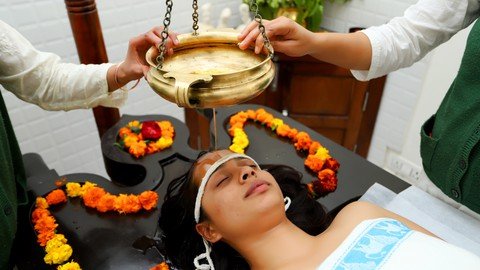
Last updated 5/2021
MP4 | Video: h264, 1280x720 | Audio: AAC, 44.1 KHz
Language: English | Size: 1.86 GB | Duration: 1h 27m
Ayurvedic basic foundation
What you'll learn
What is Ayurveda ?
Ayurveda Hostory
5 Elements of body, how it work ?
3 Doshas, identify body energies
7 Dhatus, body issues and importance
3 Malas, Wastes and it's importance
3 Body Types
Srotas, body channels has to be cleaned
3 Gunas, mind types
Agni, capacity to digest the food
Ayur Lifestyle, how you can fallow the daily rituals
Spices in daily use
General herbs of Ayurveda and its uses in daily life
Requirements
Basic English
Description
Course will teach you, Ayurveda basics is basic understanding of Ayurveda | where it came from | General Basic Principles | Body tissue and its balance | Mental Gunas | Your Body Dosha | Body Type and diet | Body Fire and its balance | Ayurvedic way of lifestyle | Uses of Herbs in daily life | Uses of Spices in daily life| How to Detox your Body Dear students once you learn the basics then you can go ahead to learn and experience the world of actual health of Ayurvedic system of medicines.ayurveda is science of herbs, healing, detox, lifestyle, wellness and cure the disease if you got it. Ayurveda is holistic, time tested, no side effects, complete natural science.you can visit our Wellness center to experience the Ayurvedic Panchkarma, Yoga and meditation, stay and Ayurvedic meals.Ganges and mountain are very nice up here to make your stay memorable.you will certainly learn and experience the great science Vata is the subtle energy associated with movement- composed of Space and Air. It governs breathing, blinking, muscle and tissue movement, pulsation of the heart, and all movements in the cytoplasm and cell membranes. In balance, vata promotes creativity and flexibility. Out of balance, vata produces fear and anxiety.Pitta expresses as the body's metabolic system - made up of Fire and Water. It governs digestion, absorption, assimilation, nutrition, metabolism and body temperature. In balance, pitta promotes understanding and intelligence. Out of balance, pitta arouses anger, hatred and jealousy.Kapha is the energy that forms the body's structure - bones, muscles, tendons - and provides the "glue" that holds the cells together, formed from Earth and Water. Kapha supplies the water for all bodily parts and systems. It lubricates joints, moisturizes the skin, and maintains immunity. In balance, kapha is expressed as love, calmness and forgiveness. Out of balance, it leads to attachment, greed and envy.Life presents us with many challenges and opportunities. Although there is much over which we have little control, we do have the power to decide about some things, such as diet and lifestyle. To maintain balance and health, it is important to pay attention to these decisions. Diet and lifestyle appropriate to one's individual constitution strengthen the body, mind and consciousness.Ayurveda as a Complementary System of HealingThe basic difference between Ayurveda and Western allopathic medicine is important to understand. Western allopathic medicine currently tends to focus on symptomatology and disease, and primarily uses drugs and surgery to rid the body of pathogens or diseased tissue. Many lives have been saved by this approach. In fact, surgery is encompassed by Ayurveda. However, drugs, because of their toxicity, often weaken the body. Ayurveda does not focus on disease. Rather, Ayurveda maintains that all life must be supported by energy in balance. When there is minimal stress and the flow of energy within a person is balanced, the body's natural defense systems will be strong and can more easily defend against disease.It must be emphasized that Ayurveda is not a substitute for Western allopathic medicine. There are many instances when the disease process and acute conditions can best be treated with drugs or surgery. Ayurveda can be used in conjunction with Western medicine to make a person stronger and less likely to be afflicted with disease and/or to rebuild the body after being treated with drugs or surgery.
Overview
Section 1: Introduction
Lecture 1 Know your Teacher
Lecture 2 History of Ayurveda
Lecture 3 Understanding Ayurveda
Lecture 4 3 Dosha
Lecture 5 7 Dhatu
Lecture 6 3 Mala( body waste)
Lecture 7 3 Guna
Lecture 8 Prakriti
Lecture 9 Srotas
Lecture 10 Agni (Fire of Body)
Lecture 11 Spices in kitchen
Lecture 12 Medicinal Herbs in Daily use
Lecture 13 Ayurvedic Lifestyle
Lecture 14 Ayurveda therapy
Lecture 15 Marma of Legs
Lecture 16 Fasting and Ayurveda
Yoga students,Holistic healer,Therapist of alternative system,Yoga teachers,Ayurveda therapist,Spa therapist,natural alternative medicine practitioner,health workers,fitness trainer,gym trainer,TCM practitiner
Homepage
Code:
https://www.udemy.com/course/ayurveda-basics-introductory-course/Recommend Download Link Hight Speed | Please Say Thanks Keep Topic Live
Fikper
lbbfi.Certificate.In.Ayurveda.Basics.Introductory.Course.part1.rar.html
lbbfi.Certificate.In.Ayurveda.Basics.Introductory.Course.part2.rar.html
Download Rapidgator
lbbfi.Certificate.In.Ayurveda.Basics.Introductory.Course.part1.rar.html
lbbfi.Certificate.In.Ayurveda.Basics.Introductory.Course.part2.rar.html
Download Uploadgig
lbbfi.Certificate.In.Ayurveda.Basics.Introductory.Course.part1.rar
lbbfi.Certificate.In.Ayurveda.Basics.Introductory.Course.part2.rar
Download Nitroflare
lbbfi.Certificate.In.Ayurveda.Basics.Introductory.Course.part1.rar
lbbfi.Certificate.In.Ayurveda.Basics.Introductory.Course.part2.rar
Links are Interchangeable - No Password - Single Extraction
